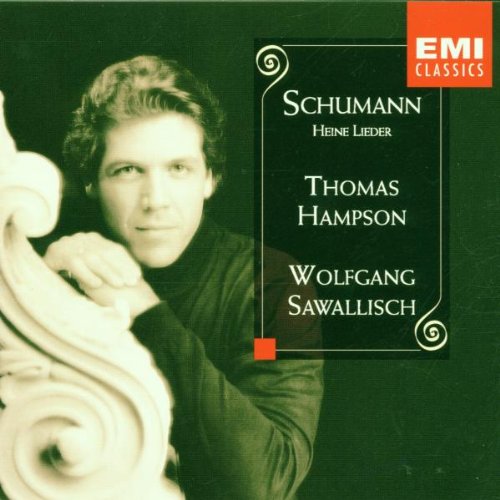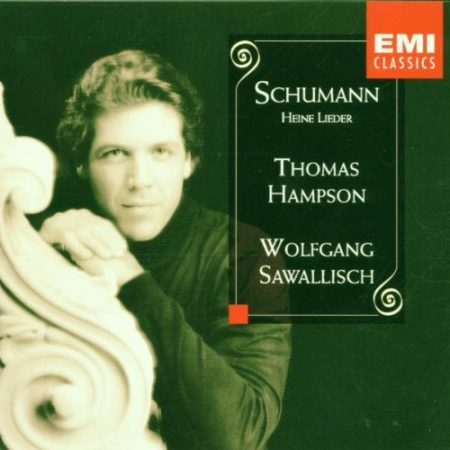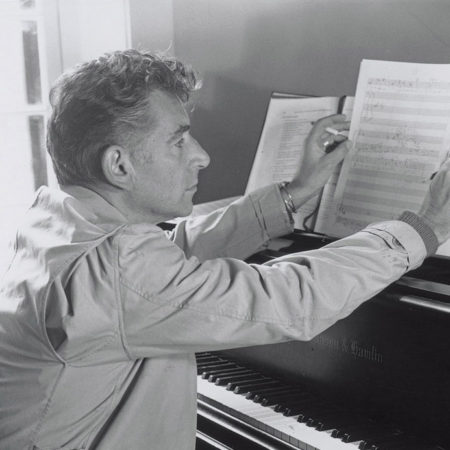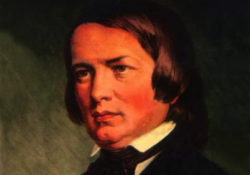Robert Schumann: Liederkreis, Op. 24
Song Cycle by Robert Schumann (1810-1856)
Text by Heinrich Heine (1797-1856)
Translations by Richard Wigmore
I. Morgens steh’ ich auf und frage
II. Es treibt mich hin, es treibt mich her
III. Ich wandelte unter den Bäumen
IV. Lieb’ Liebchen, leg’s Händchen aufs Herze mein
V. Schöne Wiege meiner Leiden
VI. Warte, warte, wilder Schiffsmann
VII. Berg’ und Burgen schaun herunter
VIII. Anfangs wollt’ ich fast verzagen
IX. Mit Myrten und Rosen
File Download
Translation © 1997, Richard Wigmore, used here with permission
Schumann-Liederkreis-Op.-24 (pdf / 46.99 KB)I.
Morgens steh’ ich auf und frage:
Kommt feins Liebchen heut?
Abends sink’ ich hin und klage:
Aus blieb sie auch heut.
In der Nacht mit meinem Kummer
Lieg’ ich schlaflos, wach;
Träumend, wie im halben Schlummer,
Träumend wandle ich bei Tag.
Kommt feins Liebchen heut?
Abends sink’ ich hin und klage:
Aus blieb sie auch heut.
In der Nacht mit meinem Kummer
Lieg’ ich schlaflos, wach;
Träumend, wie im halben Schlummer,
Träumend wandle ich bei Tag.
Each morning I get up and ask:
will my sweetheart come today?
At evening I sink down and lament:
today, too, she stayed away.
At night, with my grief,
I lie sleepless, awake;
in the daytime I wander
Dreaming, as if half-asleep.
will my sweetheart come today?
At evening I sink down and lament:
today, too, she stayed away.
At night, with my grief,
I lie sleepless, awake;
in the daytime I wander
Dreaming, as if half-asleep.
II.
Es treibt mich hin, es treibt mich her!
Noch wenige Stunden, dann soll ich sie schauen,
Sie selber, die schönste der schönen Jungfrauen; –
Du armes Herz, was pochst du so schwer!
Die Stunden sind aber ein faules Volk!
Schleppen sich behaglich träge,
Schleichen gähnend ihre Wege; –
Tummle dich, du faules Volk!
Tobende Eile mich treibend erfaßt!
Aber wohl niemals liebten die Horen; –
Heimlich im grausamen Bunde verschworen,
Spotten sie tückisch der Liebenden Hast.
Noch wenige Stunden, dann soll ich sie schauen,
Sie selber, die schönste der schönen Jungfrauen; –
Du armes Herz, was pochst du so schwer!
Die Stunden sind aber ein faules Volk!
Schleppen sich behaglich träge,
Schleichen gähnend ihre Wege; –
Tummle dich, du faules Volk!
Tobende Eile mich treibend erfaßt!
Aber wohl niemals liebten die Horen; –
Heimlich im grausamen Bunde verschworen,
Spotten sie tückisch der Liebenden Hast.
I am driven to and fro!
A few more hours and I shall see her,
her, the fairest of the maidens.
Poor heart, how hard you beat!
But the hours are a lazy lot!
They shuffle lethargically, as they please,
and, yawning, crawl on their way.
Look sharp, you lazy lot!
Raging impatience grips me, urging me on.
But the hours can never have loved.
Secretly sworn to a cruel alliance
they spitefully mock lovers’ haste.
A few more hours and I shall see her,
her, the fairest of the maidens.
Poor heart, how hard you beat!
But the hours are a lazy lot!
They shuffle lethargically, as they please,
and, yawning, crawl on their way.
Look sharp, you lazy lot!
Raging impatience grips me, urging me on.
But the hours can never have loved.
Secretly sworn to a cruel alliance
they spitefully mock lovers’ haste.
III.
Ich wandelte unter den Bäumen
Mit meinem Gram allein;
Da kam das alte Träumen
Und schlich mir ins Herz hinein.
Wer hat euch dies Wörtlein gelehret,
Ihr Vöglein in luftiger Höh’?
Schweigt still! wenn mein Herz es höret,
Dann tut es noch einmal so weh.
„Es kam ein Jungfräulein gegangen,
Die sang es immerfort,
Da haben wir Vöglein gefangen
Das hübsche, goldne Wort.”
Das sollt ihr mir nicht mehr erzählen,
Ihr Vöglein wunderschlau;
Ihr wollt meinem Kummer mir stehlen,
Ich aber niemandem trau’.
Mit meinem Gram allein;
Da kam das alte Träumen
Und schlich mir ins Herz hinein.
Wer hat euch dies Wörtlein gelehret,
Ihr Vöglein in luftiger Höh’?
Schweigt still! wenn mein Herz es höret,
Dann tut es noch einmal so weh.
„Es kam ein Jungfräulein gegangen,
Die sang es immerfort,
Da haben wir Vöglein gefangen
Das hübsche, goldne Wort.”
Das sollt ihr mir nicht mehr erzählen,
Ihr Vöglein wunderschlau;
Ihr wollt meinem Kummer mir stehlen,
Ich aber niemandem trau’.
I wandered beneath the trees
alone with my grief.
Then dreams of old came
and stole into my heart.
Who taught you that word,
birds in the airy heights?
Hush! When my heart hears it
once more it aches.
“A maiden came walking,
who sang it all the time.
Then we birds took up
that lovely, golden word.”
You should not tell me this,
birds of wondrous cunning.
You should steal my grief from me,
but I trust no one with it.
alone with my grief.
Then dreams of old came
and stole into my heart.
Who taught you that word,
birds in the airy heights?
Hush! When my heart hears it
once more it aches.
“A maiden came walking,
who sang it all the time.
Then we birds took up
that lovely, golden word.”
You should not tell me this,
birds of wondrous cunning.
You should steal my grief from me,
but I trust no one with it.
IV.
Lieb’ Liebchen, leg’s Händchen aufs Herze mein; –
Ach, hörst du, wie’s pochet im Kämmerlein?
Da hauset ein Zimmermann schlimm und arg,
Der zimmert mir einen Totensarg.
Es hämmert und klopfet bei Tag und bei Nacht;
Es hat mich schon längst um den Schlaf gebracht.
Ach! sputet euch, Meister Zimmermann,
Damit ich balde schlafen kann.
Ach, hörst du, wie’s pochet im Kämmerlein?
Da hauset ein Zimmermann schlimm und arg,
Der zimmert mir einen Totensarg.
Es hämmert und klopfet bei Tag und bei Nacht;
Es hat mich schon längst um den Schlaf gebracht.
Ach! sputet euch, Meister Zimmermann,
Damit ich balde schlafen kann.
Dearest sweetheart, lay your hand on my heart.
can you hear how it pounds in its room?
A carpenter lodges there, vile and wicked,
building me a coffin.
The hammering and banging, day and night,
has long robbed me of sleep.
Hurry, master carpenter,
that I soon may sleep.
can you hear how it pounds in its room?
A carpenter lodges there, vile and wicked,
building me a coffin.
The hammering and banging, day and night,
has long robbed me of sleep.
Hurry, master carpenter,
that I soon may sleep.
V.
Schöne Wiege meiner Leiden,
Schönes Grabmal meiner Ruh’,
Schöne Stadt, wir müssen scheiden, –
Lebe wohl! ruf’ ich dir zu.
Lebe wohl, du heil’ge Schwelle,
Wo da wandelt Liebchen traut;
Lebe wohl! du heil’ge Stelle,
Wo ich sie zuerst geschaut.
Hätt’ ich dich doch nie geseh’n,
Schöne Herzenskönigin!
Nimmer wär’ es dann geschehen,
Daß ich jetzt so elend bin.
Nie wollt’ ich dein Herze rühren,
Liebe hab’ ich nie erfleht;
Nur ein stilles Leben führen
Wollt’ ich, wo dein Odem weht.
Doch du drängst mich selbst von hinnen,
Bittre Worte spricht dein Mund;
Wahnsinn wühlt in meinen Sinnen,
Und mein Herz ist krank und wund.
Und die Glieder matt und träge
Schlepp’ ich fort am Wanderstab,
Bis mein müdes Haupt ich lege
Ferne in ein kühles Grab.
Schönes Grabmal meiner Ruh’,
Schöne Stadt, wir müssen scheiden, –
Lebe wohl! ruf’ ich dir zu.
Lebe wohl, du heil’ge Schwelle,
Wo da wandelt Liebchen traut;
Lebe wohl! du heil’ge Stelle,
Wo ich sie zuerst geschaut.
Hätt’ ich dich doch nie geseh’n,
Schöne Herzenskönigin!
Nimmer wär’ es dann geschehen,
Daß ich jetzt so elend bin.
Nie wollt’ ich dein Herze rühren,
Liebe hab’ ich nie erfleht;
Nur ein stilles Leben führen
Wollt’ ich, wo dein Odem weht.
Doch du drängst mich selbst von hinnen,
Bittre Worte spricht dein Mund;
Wahnsinn wühlt in meinen Sinnen,
Und mein Herz ist krank und wund.
Und die Glieder matt und träge
Schlepp’ ich fort am Wanderstab,
Bis mein müdes Haupt ich lege
Ferne in ein kühles Grab.
Fair cradle of my sorrows,
fair tombstone of my peace,
fair town, we must part.
Farewell, I cry to you.
Farewell, sacred threshold
where my dearest love walks.
Farewell, sacred spot
where I first saw her.
Would that I had never seen you,
fair queen of my heart.
Then it would never have happened
that I am now so wretched.
I never wished to touch your heart,
I have never begged for love.
All I wished was to lead a tranquil life
where you breathed.
But you yourself are driving me away.
Your lips speak bitter words.
Madness gnaws at my senses,
and my heart is sick and wounded.
And with weary, listless limbs
I will trudge away on my stick,
till I lay down my tired head
in a cool, distant grave.
fair tombstone of my peace,
fair town, we must part.
Farewell, I cry to you.
Farewell, sacred threshold
where my dearest love walks.
Farewell, sacred spot
where I first saw her.
Would that I had never seen you,
fair queen of my heart.
Then it would never have happened
that I am now so wretched.
I never wished to touch your heart,
I have never begged for love.
All I wished was to lead a tranquil life
where you breathed.
But you yourself are driving me away.
Your lips speak bitter words.
Madness gnaws at my senses,
and my heart is sick and wounded.
And with weary, listless limbs
I will trudge away on my stick,
till I lay down my tired head
in a cool, distant grave.
VI.
Warte, warte, wilder Schiffsmann,
Gleich folg’ ich zum Hafen dir;
Von zwei Jungfraun nehm’ ich Abschied,
Von Europa und von Ihr.
Blutquell, rinn’ aus meinen Augen,
Blutquell, brich aus meinem Leib,
Daß ich mit dem heißen Blute
Meine Schmerzen niederschreib’.
Ei, mein Lieb, warum just heute
Schauderst du, mein Blut zu sehn?
Sahst mich bleich und herzeblutend
Lange Jahre vor dir steh’n!
Kennst du noch das alte Liedchen
Von der Schlang’ im Paradies,
Die durch schlimme Apfelgabe
Unsern Ahn ins Elend stieß.
Alles Unheil brachten Äpfel!
Eva bracht’ damit den Tod,
Eris brachte Trojas Flammen,
Du brachst’st beides, Flamm’ und Tod.
Gleich folg’ ich zum Hafen dir;
Von zwei Jungfraun nehm’ ich Abschied,
Von Europa und von Ihr.
Blutquell, rinn’ aus meinen Augen,
Blutquell, brich aus meinem Leib,
Daß ich mit dem heißen Blute
Meine Schmerzen niederschreib’.
Ei, mein Lieb, warum just heute
Schauderst du, mein Blut zu sehn?
Sahst mich bleich und herzeblutend
Lange Jahre vor dir steh’n!
Kennst du noch das alte Liedchen
Von der Schlang’ im Paradies,
Die durch schlimme Apfelgabe
Unsern Ahn ins Elend stieß.
Alles Unheil brachten Äpfel!
Eva bracht’ damit den Tod,
Eris brachte Trojas Flammen,
Du brachst’st beides, Flamm’ und Tod.
Wait, wait, rough sailor,
I’ll follow you now to the port.
I am taking my leave of two maidens,
of Europe and of Her.
Stream of blood, flow from my eyes,
stream of blood, gush from my body
That with the hot blood
I may write down my sorrows.
My love, why just today
do you recoil at the sight of my blood?
For long years you have seen me before you,
pale and with bleeding heart.
Do you remember the old tale
Of the serpent in Paradise,
which through the wicked gift of an apple
cast our forebears into misery?
Apples have brought all our misfortunes.
With them Eve brought death,
and Eris the flames of Troy.
You have brought both—flames and death.
I’ll follow you now to the port.
I am taking my leave of two maidens,
of Europe and of Her.
Stream of blood, flow from my eyes,
stream of blood, gush from my body
That with the hot blood
I may write down my sorrows.
My love, why just today
do you recoil at the sight of my blood?
For long years you have seen me before you,
pale and with bleeding heart.
Do you remember the old tale
Of the serpent in Paradise,
which through the wicked gift of an apple
cast our forebears into misery?
Apples have brought all our misfortunes.
With them Eve brought death,
and Eris the flames of Troy.
You have brought both—flames and death.
VII.
Berg’ und Burgen schaun herunter
In den spiegelhellen Rhein,
Und mein Schiffchen segelt munter,
Rings umglänzt von Sonnenschein.
Ruhig seh’ ich zu dem Spiele
Goldner Wellen, kraus bewegt;
Still erwachen die Gefühle,
Die ich tief im Busen hegt’.
Freundlich grüssend und verheißend
Lockt hinab des Stromes Pracht;
Doch ich kenn’ ihn, oben gleißend,
Birgt sein Innres Tod und Nacht.
Oben Lust, im Busen Tücken,
Strom, du bist der Liebsten Bild!
Die kann auch so freundlich nicken,
Lächelt auch so fromm und mild.
In den spiegelhellen Rhein,
Und mein Schiffchen segelt munter,
Rings umglänzt von Sonnenschein.
Ruhig seh’ ich zu dem Spiele
Goldner Wellen, kraus bewegt;
Still erwachen die Gefühle,
Die ich tief im Busen hegt’.
Freundlich grüssend und verheißend
Lockt hinab des Stromes Pracht;
Doch ich kenn’ ihn, oben gleißend,
Birgt sein Innres Tod und Nacht.
Oben Lust, im Busen Tücken,
Strom, du bist der Liebsten Bild!
Die kann auch so freundlich nicken,
Lächelt auch so fromm und mild.
Mountains and castles gaze down
into the clear, mirroring Rhine.
And my little boat sails blithely along,
surrounded by glistening sunlight.
Calmly I watch the play
of the golden, rippling waves.
Softly those feelings awaken
which I cherished deep in my heart.
Sweetly greeting, promising,
the river’s splendour lures me down;
But I know it—sparkling on the surface,
it hides night and death in its depths.
Joy above, malice in its heart:
river, you are the image of my love.
She can nod just as sweetly,
smile just as gently and innocently.
into the clear, mirroring Rhine.
And my little boat sails blithely along,
surrounded by glistening sunlight.
Calmly I watch the play
of the golden, rippling waves.
Softly those feelings awaken
which I cherished deep in my heart.
Sweetly greeting, promising,
the river’s splendour lures me down;
But I know it—sparkling on the surface,
it hides night and death in its depths.
Joy above, malice in its heart:
river, you are the image of my love.
She can nod just as sweetly,
smile just as gently and innocently.
VIII.
Anfangs wollt’ ich fast verzagen,
Und ich glaubt’, ich trüg’ es nie;
Und ich hab’ es doch getragen –
Aber fragt mich nur nicht, wie?
Und ich glaubt’, ich trüg’ es nie;
Und ich hab’ es doch getragen –
Aber fragt mich nur nicht, wie?
At first I almost despaired,
thinking I could never bear it.
Yet borne it I have,
but do not ask me how.
thinking I could never bear it.
Yet borne it I have,
but do not ask me how.
IX.
Mit Myrten und Rosen, lieblich und hold,
Mit duft’gen Zypressen und Flittergold,
Möcht’ ich zieren dieß Buch wie ‘nen Totenschrein,
Und sargen meine Lieder hinein.
O könnt’ ich die Liebe sargen hinzu!
Auf dem Grabe der Liebe wächst Blümlein der Ruh’,
Da blüht es hervor, da pflückt man es ab, –
Doch mir blüht’s nur, wenn ich selber im Grab.
Hier sind nun die Lieder, die einst so wild,
Wie ein Lavastrom, der dem Ätna entquillt,
Hervorgestürtzt aus dem tiefsten Gemüt,
Und rings viel blitzende Funken versprüht!
Nun liegen sie stumm und totengleich,
Nun starren sie kalt und nebelbleich,
Doch aufs neu die alte Glut sie belebt,
Wenn der Liebe Geist einst über sie schwebt.
Und es wird mir im Herzen viel Ahnung laut:
Der Liebe Geist einst über sie taut;
Einst kommt dies Buch in deine Hand,
Du süßes Lieb im fernen Land.
Dann löst sich des Liedes Zauberbann,
Die blaßen Buchstaben schaun dich an,
Sie schauen dir flehend ins schöne Aug’,
Und flüstern mit Wehmut und Liebeshauch.
Mit duft’gen Zypressen und Flittergold,
Möcht’ ich zieren dieß Buch wie ‘nen Totenschrein,
Und sargen meine Lieder hinein.
O könnt’ ich die Liebe sargen hinzu!
Auf dem Grabe der Liebe wächst Blümlein der Ruh’,
Da blüht es hervor, da pflückt man es ab, –
Doch mir blüht’s nur, wenn ich selber im Grab.
Hier sind nun die Lieder, die einst so wild,
Wie ein Lavastrom, der dem Ätna entquillt,
Hervorgestürtzt aus dem tiefsten Gemüt,
Und rings viel blitzende Funken versprüht!
Nun liegen sie stumm und totengleich,
Nun starren sie kalt und nebelbleich,
Doch aufs neu die alte Glut sie belebt,
Wenn der Liebe Geist einst über sie schwebt.
Und es wird mir im Herzen viel Ahnung laut:
Der Liebe Geist einst über sie taut;
Einst kommt dies Buch in deine Hand,
Du süßes Lieb im fernen Land.
Dann löst sich des Liedes Zauberbann,
Die blaßen Buchstaben schaun dich an,
Sie schauen dir flehend ins schöne Aug’,
Und flüstern mit Wehmut und Liebeshauch.
With myrtles and roses, charming and dear,
with fragrant cypresses and gold tinsel
I would decorate this book like a coffin.
And bury my songs within it.
Oh, could I but bury my love there too!
On love’s grave grows the flower of peace;
there it blossoms, there it is picked.
For me it will bloom only when I am in my grave.
Here, then, are songs which once, wild
as a stream of lava gushing from Etna,
burst from the depths of my soul,
showering many flashing sparks around.
Now they lie mute, as if dead,
rigid, cold, pale as mist;
but the old fire will revive them afresh
if ever love’s spirit should hover over them.
Many an intimation stirs within my heart:
the spirit of love will one day dawn above them,
and one day this book will come into your hands,
my sweet love, in a far-off land.
The magic spell on my songs shall be broken;
the pale letters shall gaze at you,
gaze beseechingly into your lovely eyes,
and whisper with the melancholy breath of love.
with fragrant cypresses and gold tinsel
I would decorate this book like a coffin.
And bury my songs within it.
Oh, could I but bury my love there too!
On love’s grave grows the flower of peace;
there it blossoms, there it is picked.
For me it will bloom only when I am in my grave.
Here, then, are songs which once, wild
as a stream of lava gushing from Etna,
burst from the depths of my soul,
showering many flashing sparks around.
Now they lie mute, as if dead,
rigid, cold, pale as mist;
but the old fire will revive them afresh
if ever love’s spirit should hover over them.
Many an intimation stirs within my heart:
the spirit of love will one day dawn above them,
and one day this book will come into your hands,
my sweet love, in a far-off land.
The magic spell on my songs shall be broken;
the pale letters shall gaze at you,
gaze beseechingly into your lovely eyes,
and whisper with the melancholy breath of love.
Schumann: Heine Lieder
Thomas Hampson, baritone
Wolfgang Sawallisch, piano
Recorded: 1994 / Album Release: 1997
EMI Classics: CDC55598



